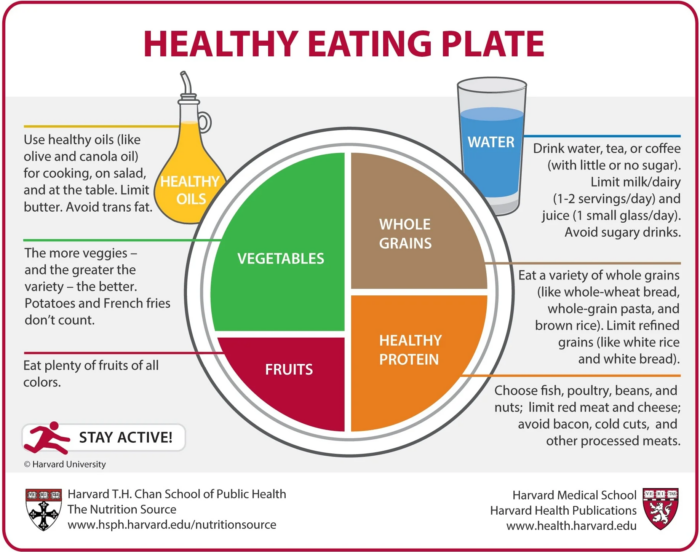Living with anxiety or depression can make it challenging to prioritize self-care, including nutrition. However, what we eat plays a crucial role in our mental health! By making mindful choices about our diet, we can support our overall well-being and even alleviate some symptoms of anxiety and depression. Here are some tips for nourishing your mind through nutrition, even when you’re struggling.

Prioritize Balanced Meals
When anxiety or depression strikes, it’s easy to turn to convenience foods or skip meals altogether. However, maintaining stable blood sugar levels is essential for mood regulation. Aim for balanced meals that include a combination of complex carbohydrates, lean proteins, and healthy fats. This balance helps sustain energy levels and promotes serotonin production, a neurotransmitter associated with mood regulation.
Copyright © 2011, Harvard University. For more information about The Healthy Eating Plate, please see The Nutrition Source, Department of Nutrition, Harvard T.H. Chan School of Public Health, www.thenutritionsource.org, and Harvard Health Publications, www.health.harvard.edu.
Keep Foods That are Easy to Prepare Readily Available
Stock your fridge and your pantry with foods from all the food groups that are already prepared or easy to prepare. Things like individual yogurts or string cheese, canned and frozen fruit and vegetables, pre-cooked microwavable rice packs, pre-cooked and frozen meats, canned fish, instant oatmeal. All of these items can be put together to make a balanced meal. It may not be something you would serve a friend, but it can give you the nutrients you need to stay healthy and feed your brain.
Include Mood-Boosting Foods
Certain nutrients have been linked to improved mood and mental health. Incorporate foods rich in omega-3 fatty acids, such as salmon, flaxseeds, and walnuts, which have anti-inflammatory properties and may help reduce symptoms of depression. Additionally, foods high in antioxidants, like berries, dark leafy greens, and colorful vegetables, can help combat oxidative stress and support brain health.
Limit Stimulants and Sugar
While caffeine and sugar may provide temporary energy boosts, they can exacerbate feelings of anxiety and contribute to mood swings. Limit your intake of caffeinated beverages like coffee, tea, and soda, especially in the afternoon and evening, to promote better sleep quality. Similarly, minimize consumption of refined sugars and opt for natural sweeteners like honey or fruit when craving something sweet.
Stay Hydrated
Dehydration can worsen feelings of fatigue and irritability, making it essential to prioritize adequate hydration. Aim to drink plenty of water throughout the day, and consider incorporating hydrating foods like cucumbers, watermelon, and oranges into your diet. Herbal teas can also be a soothing and hydrating option, especially if you’re trying to reduce your caffeine intake.
Practice Mindful Eating
During moments of heightened anxiety or low mood, it’s common to engage in emotional eating or mindless snacking. Instead, practice mindful eating by paying attention to your hunger and fullness cues, as well as the sensory experience of eating. Take your time to savor each bite, and try to eat without distractions to fully appreciate the nourishment your food provides.
Seek Professional Support
While nutrition plays a significant role in mental health, it’s essential to recognize that it’s just one piece of the puzzle. If you’re struggling with anxiety or depression, consider seeking support from a mental health professional who can provide personalized guidance and treatment options tailored to your needs. Additionally, a dietitian can help you maximize your nutrition even when you are struggling.
Taking care of your nutrition is a powerful way to support your mental health, even when faced with anxiety or depression. By prioritizing balanced meals, keeping easy to make foods around, incorporating mood-boosting foods, and practicing mindful eating, you can nourish your mind and body from the inside out. Remember to be gentle with yourself on your journey to better mental well-being and to reach out for support when needed. Together, we can work towards a healthier and happier future.
Avance Care is here for you.
To get connected with our team of registered dietitians, contact our nutrition coordinators at 919.237.1337.
To get connected with our behavioral health team, contact our behavioral health coordinators at 919.874.5443.




